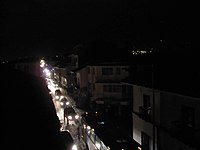
Photo from wikipedia
The complete blackout of information technology (IT) in a hospital represents a major incident with acute loss of functionality. The immediate consequence is a rapidly progressive loss of treatment capacity. The… Click to show full abstract
The complete blackout of information technology (IT) in a hospital represents a major incident with acute loss of functionality. The immediate consequence is a rapidly progressive loss of treatment capacity. The major priority for the acute management of such an event is to keep patients safe and prevent life-threatening situations. A possibility to channel the uncontrolled loss of treatment capacity in order to achieve the aforementioned protective target is the immediate organization of an analog system for baseline emergency medical care. The switch over from a fully operational routinely functioning system to a reduced emergency state occurs daily in hospitals (night shift, weekends, public holidays) and reflects the controlled reduction of the treatment capacity. This process and the procedures associated with it are universally known, the functions are clearly defined and planned in advance by duty rotas and the interplay of clinics in the organizational schedule is regulated in detail. In order to accomplish this strategy analog instruments are necessary. These must all be conceived, established, practiced and evaluated in advance with the clinics and departments. Ultimately, all isolated IT blackout concepts must be amalgamated into a compatible and functioning total framework. This structure must be maintained for as long as a partially or totally functioning IT has been reinstated.
Journal Title: Der Unfallchirurg
Year Published: 2020
Link to full text (if available)
Share on Social Media: Sign Up to like & get
recommendations!